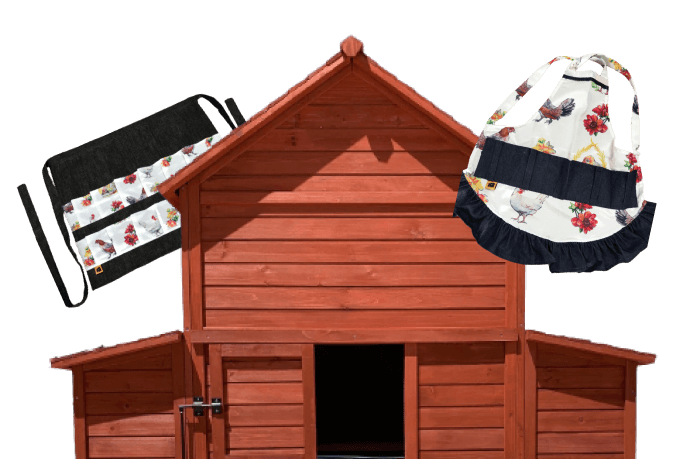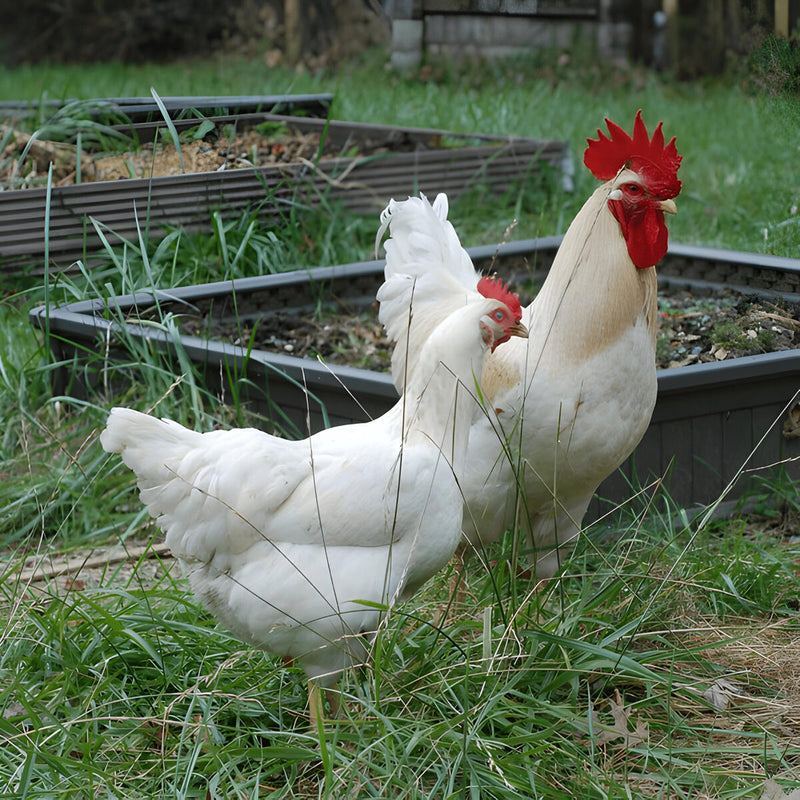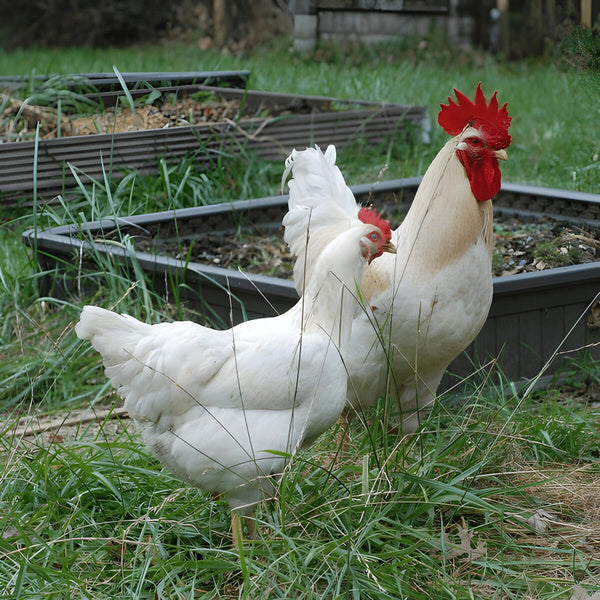-
Size
Large Fowl
-
Egg Color
Brown
-
Egg Size
Large
-
Egg Quantity
Very Good (4/wk)
-
Personality
Active
-
Abundance
Common
-
Cold Tolerance
Hardy In Winter
-
Feathered Feet
No
-
Heat Tolerance
Tolerates Heat Well
White Plymouth Rock
White Plymouth Rock Chicken
The White Plymouth Rock chicken was recognized as a distinct breed and admitted to the American Standard of Perfection as a pure breed chicken in 1888. This chicken is a versatile, dual-purpose breed, making it an excellent choice for both egg production and meat. Known by their short name, White Rock chickens are a valued member of the Plymouth Rock family. These birds are a part of American poultry heritage, often found on farms in the past.
White Rock hens are prolific layers, producing large to extra-large brown eggs. The cockerels grow into excellent fryers. While they share many characteristics with the Barred Rocks, White Rocks are unique in their pure white plumage. As chicks, they can display a range of fuzz colors from white to dark smoky hues, but as they mature, they develop white feathers. Adult White Rocks typically have yellow legs, though younger birds may show darker leg coloration.
These chickens are known for their graceful, inquisitive, and friendly nature, making them easy to manage. Though not as popular as Barred Rocks, White Rocks are well-regarded for their soft feathers and down-like undercoat, which make them particularly cold-hardy. They are a great addition to any backyard flock.
White Rock hens begin laying eggs around five months of age, making them some of the earliest maturing layers. Like most hens, they will go through a molting period after several months of laying. During this time, they may lose feathers, appear scruffy, and stop laying eggs. Their comb and wattles may also turn pale. The molting process can last from four to eight weeks. Once their comb and wattles return to a bright red color and they begin to sing again, you can expect them to resume laying eggs.
The White Rock chicken is also utilized as the female side in the commercial Cornish Broiler Cross chicken breeding. The Chicken Coop Company offers this fantastic dual-purpose White Rock chicken for sale, and it is highly recommended to consider adding this heritage breed to your backyard flock.
Health and Care:
-
Hardy and Resilient: White Plymouth Rock chickens are hardy and adaptable to a variety of climates. They are especially well-suited to both hot and cold weather conditions. Their feathering provides decent protection against the cold, but extra care should be taken during very harsh winters to ensure they have a warm, dry place to sleep.
-
Disease Resistance: These chickens are generally resistant to common poultry diseases, but like any breed, they can still be susceptible to issues like mites, lice, and respiratory problems if not properly cared for. Ensuring a clean, dry living environment with proper ventilation can help keep them healthy.
-
Low Maintenance: White Plymouth Rocks are relatively low-maintenance. They do not require special diets or complicated care routines. They thrive when given the basics—space to roam, access to clean water, nutritious feed, and a secure place to rest. They are also hardy foragers, which helps when kept in free-range conditions.

Egg Laying:
-
Excellent Egg Production: White Plymouth Rock chickens are excellent layers. They produce a high quantity of eggs, typically around 200-280 medium to large brown eggs per year. Their consistent egg production makes them a favorite among backyard poultry keepers who need a reliable egg source.
-
Year-Round Laying: This breed is known for its ability to lay year-round, even in the colder months. While egg production may slow down slightly during winter, it rarely stops altogether. Their strong laying ability makes them an excellent choice for both commercial and small-scale egg production.
-
Large Brown Eggs: The eggs they produce are medium to large in size, with a rich brown color. Their large, consistent eggs are a prized feature, and they are valued for their quality in both home kitchens and egg markets.

Temperament:
-
Friendly and Docile: White Plymouth Rocks are known for their friendly and calm temperament. They are a sociable breed that gets along well with humans and other chickens. Their docile nature makes them ideal for families, backyard flocks, or small farms.
-
Easy to Handle: These chickens are easy to handle and enjoy human interaction. They are often calm around people, making them a good choice for beginners or those who want a chicken that is comfortable being handled by children.
-
Moderately Active: White Plymouth Rocks are moderately active and enjoy foraging in the yard or pasture. They are good foragers, which makes them great for free-range environments. While not the most energetic breed, they do enjoy exploring their surroundings, which helps with their overall well-being.
Appearance:
-
Striking White Plumage: As the name suggests, the White Plymouth Rock chicken is known for its pure white feathers. This is in contrast to the traditional barred Plymouth Rock, which has a striped pattern. The solid white plumage gives them a clean and elegant appearance.
-
Medium Size: The White Plymouth Rock is a medium-sized bird. Hens typically weigh around 6-7 pounds, while roosters weigh about 7-8 pounds. Despite being relatively large, they have a calm demeanor and are easy to handle.
-
Single Comb and Wattles: Like most chickens, White Plymouth Rocks have a single comb and wattles. Their comb is medium-sized, upright, and red, which stands out against their white feathers. Their wattles and earlobes are also red, contributing to their vibrant and attractive appearance.
- Broad Body and Sturdy Build: The White Plymouth Rock has a broad, deep chest and a sturdy build. They are compact, muscular birds that are well-suited for both egg-laying and meat production. Their physical structure makes them ideal for dual-purpose farming.
Frequently Asked Questions:
What is a White Plymouth Rock?
White Plymouth Rock Chickens are distinguished by their large, all-white plumage and their calm, friendly demeanor. Originating in Massachusetts, these birds were named after Plymouth Rock, the historic landing site of the Pilgrims. Known for their consistent egg production, White Plymouth Rock chickens typically lay about 4-6 brown eggs each week.
Are White Rock Chickens Good Layers?
Yes, White Rock hens are renowned for their excellent egg production. Depending on the strain, they can lay up to 280 eggs annually. This breed is celebrated for its versatility, serving well for both egg production and meat. The eggs they produce are generally large to extra-large.
What Color Eggs Do White Plymouth Rock Chickens Lay?
White Plymouth Rock hens lay medium to large light brown eggs. The exact shade of brown can vary slightly between different strains of the breed, influenced by the color of the bloom applied to the egg before laying.
Are White Rock Chickens Good to Eat?
White Rock chickens are notable for their impressive growth rate, reaching an average weight of around 8 lbs by processing time. While they grow quickly as chicks, their growth rate slows significantly as they mature. The meat is tender and flavorful, making them a good choice for consumption.
What About White Plymouth Rock Chickens?
White Plymouth Rock chickens are well-suited for general farm life. They are docile and exhibit some broodiness, characterized by their long, broad backs and moderately deep, full breasts. They have a single, moderate-sized comb and are considered a reliable breed for both laying eggs and meat.
White Plymouth Rock Facts
- Poultry Show Class: American Class
- Weights: Hen—–7 1/2 lbs
- Rooster——9 1/2 lbs
- Pullet—6 lbs
- Cockerel—-8 lbs
- Purpose and Type: Primary production, Egg Laying & Pet/Secondary meat source
- Egg Shell Color: Brown
- Egg Production: 200 – 280 eggs per year (estimates only)
- Egg Size: Large
- Temperament: Docile
- Gender Accuracy: 85-90%
- Fertility Percentage: 65-80%
- Broody: Setter
- Mating Ratio: 10 Females to 1 Male
- Roost Height: 2 to 4 feet
- Country of Origin: United States
- APA: Yes, Recognized by the Standard of Perfection in 1888
- TLC: Recovering status, Considered a Heritage Sustainable Chicken Breed
- Breeder Farm Source: Poultry Breeding Farm has been developing our bloodline or strain of White Plymouth Rock chicken since 1937.
Notice: We do not sell items on Amazon or other websites.




